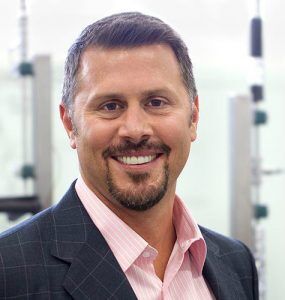
One arena in which the cannabis industry has struggled to make serious gains is the stock market.
Most plant-touching companies that are also publicly traded still live on the over-the-counter markets, dreaming of the day when they’ll graduate to the Nasdaq or the New York Stock Exchange.
Derek Peterson is no exception.
As the founder and CEO of California-based Terra Tech Corp. – one of the largest and most stable publicly traded plant-touching cannabis companies in the United States – Peterson’s ambitions for his business include getting to $100 million in revenue and then upgrading from over-the-counter markets to a major stock exchange.
Terra Tech has acquired 10 marijuana retail and cultivation permits in both California and neighboring Nevada since its founding in 2008, along with a burgeoning traditional produce business to help diversify its portfolio.

Though Terra Tech’s financials for 2017 haven’t been fully released yet, the company stands to do even better, with revenue of nearly $25 million for just the first three quarters of last year.
Marijuana Business Daily caught up with Peterson to talk about marijuana banking issues, Terra Tech’s growth and how U.S. cannabis companies can compete with their Canadian counterparts.
What are the biggest challenges in running a publicly traded plant-touching company?
Banking. Because we’re publicly traded, we have quarterly reviews and annual audits.
And because we have to deal in cash at almost all of our locations in some capacity … we have no long-term banking solution generally in any market.
That adds a ton of time and complexity to the audit.
When you add time to the audit, it raises the risk of not meeting your filing deadline. When you add complexity to the audit, it raises the cost.
The cash handling – besides the security of it, the expense of it, the irritation of it – creates a very challenging and expensive environment to audit a public company.
Literally everything – every transaction that we make on the cultivation side or the retail side, every piece of product that passes through distribution to retail, every product movement – needs some sort of journal entry in our accounting.
Any one of those journal entries in the accounting could be subject to our audit review at the end of the year.
We have to do monthly cash counts, where auditors come out to our facilities and reconcile our cash on a monthly basis at our different locations.
It just ties into so many little nuanced areas of the company, from the reporting, from the 10-K filings, to the Q filings to different 8-K filings.
Terra Tech’s revenue more than tripled from $7 million to $25 million between 2014 and 2016, and you were at nearly $25 million during the first nine months of 2017. What do you attribute that solid growth to?
The main driver over the last year was the implementation of adult use in Nevada.
We hold the most permits in Nevada. We have four retail stores, large-scale cultivation, large-scale extraction, two additional stores that we have in partnership with NuLeaf by sharing a cultivation facility.
We also had some other acquisitions and some organic growth within California, and some growth on the (traditional) produce side.
This year, we’re spending more time on pushing our wholesale brand throughout California.
We’re lighting up a lot more cultivation and extraction space in the California marketplace.
We’re bringing online our large-scale cultivation and extraction facility in Nevada.
So, this year, we’re hoping that a lot of the organic growth will come from M&A on the retail side and from organic growth of our manufacturing and wholesale brands.
Which states or countries are you targeting for expansion?
We were heavily focused on Nevada.
Being in Nevada was not only to take care of the tourism aspect, but you get macrobranding there because you get to expose your brand to people from Asia and Europe and everywhere.
That’s a really interesting byproduct of doing business in Nevada.
California, the sixth-largest economy in the world, biggest cannabis market – it’s a no-brainer to be here.
We were really avoiding all the other states.
In New Jersey, we have a farm where we grow Edible Gardens produce.
And new Gov. (Phil) Murphy is now expanding medical and fast-tracking adult use at some point this year, so by default we’re going to go to Jersey.
We want to execute in those three states and grab as much market share as we can with our brands.
What do you think Terra Tech may have to do to compete long term on an international scale, given that Canadian companies are expanding their footprints so quickly and taking the lead globally?
It’s access to capital. Real institutional support will change that paradigm drastically.
True access to Wall Street capital markets, not just the smaller hedge funds and the family offices, but real institutional access will change the paradigm for a lot of players in the United States.
That’s where the industry really grows.
Is Congress going to have to act in some way before that happens?
I think so, but I don’t think we need to see federal legalization.
What it may be is just some fixed piece of law that looks a lot like the Rohrabacher-Blumenauer Amendment, which is, hands-off, states’ rights and so on.
That is probably enough to open up access to the capital markets, the institutional capital, the large broker dealers and the investment banks.
I don’t think we need sweeping federal legalization, but we need something codified in law that says, “Hands-off the states when it pertains to this.”
This interview has been edited for length and clarity.
John Schroyer can be reached at [email protected]


